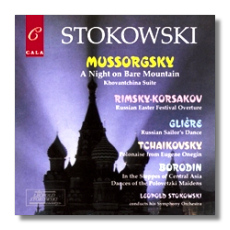
The Internet's Premier Classical Music Source
Related Links
-
Borodin Reviews
Glière Reviews
Mussorgsky Reviews
Rimsky-Korsakoff Reviews
Tchaikovsky Reviews - Latest Reviews
- More Reviews
-
By Composer
-
Collections
DVD & Blu-ray
Books
Concert Reviews
Articles/Interviews
Software
Audio
Search Amazon
Recommended Links
Site News
 CD Review
CD Review
A Russian Spectacular

- Modest Mussorgsky:
- A Night on Bare Mountain (orch. Stokowski)
- Khovantchina
- Act 1: Prelude (Dawn over Moscow) [orch. Rimsky-Korsakov]
- Act 4: Dance of the Persian Maidens [orch. Rimsky-Korsakov]
- Act 4: Entr'acte (Prince Galitsin's Journey) [orch. Stokowski]
- Nikolai Rimsky-Korsakoff: Russian Easter Overture *
- Reinhold Glière: The Red Poppy (Russian Sailor's Dance)
- Piotr Ilyitch Tchaikovsky: Eugene Onegin (Polonaise)
- Alexander Borodin:
- In the Steppes of Central Asia
- Prince Igor (Dances of the Polovetzki Maidens)
* Nicola Moscona, bass
Stokowski Symphony Orchestra/Leopold Stokowski
Cala CACD0546
Mr. Robert Stumpf II is basically Classical Net's authority on Leopold Stokowski, and I have enjoyed the opportunity to read his extensive work as well as the chance to contribute my own thoughts on these discs. As always, I suggest you also read his work; his reviews generally were published directly after release of the albums in question, and are always full of exceptionally good information. His enthusiasm for this particular album is only partially shared by yours truly, however.
Of the excellence of A Night on Bare Mountain, there can be no question. These musicians play like demons possessed (wholly appropriate for the music in question, mind), and I find this superior in many ways to the conductor's "Phase 4" Decca effort. Stokowski appears to be in a more spontaneous and freewheeling mood, and the pickup band of about 60 follows his every whim. As Mr. Stumpf pointed out in some of his other reviews, Stoki's famed sonic manipulations make the orchestra sound enormous, while the monaural sound feels like early stereo. These mid-fifties recordings all sound spectacular for their vintage. The playing convinces me less; I find the strings erratic throughout the program. But as my colleague correctly pointed out, certain moments are truly magical. The opening of the Borodin tone poem is phenomenal.
As for a bass soloist being used in the Russian Easter Overture, I admit to not liking it. This is already a piece that can go wrong in so many places, and a distantly milked and decidedly boomy soloist simply does not convince me. Excellent recordings made in the last decade or so have convinced me that the work can be successful, but no gimmicks are required. In Stokowski's own arrangement of the Dances from Prince Igor, the music is not particular different than what we know. His later recording with the Royal Philharmonic on Decca is curiously the standard version that most of us know, and nearly five full minutes shorter. The remainder of the program is a hearty selection of showpieces. So while I'm not over the moon about the whole disc, the good stuff is nothing short of outstanding.
Copyright © 2015, Brian Wigman





















